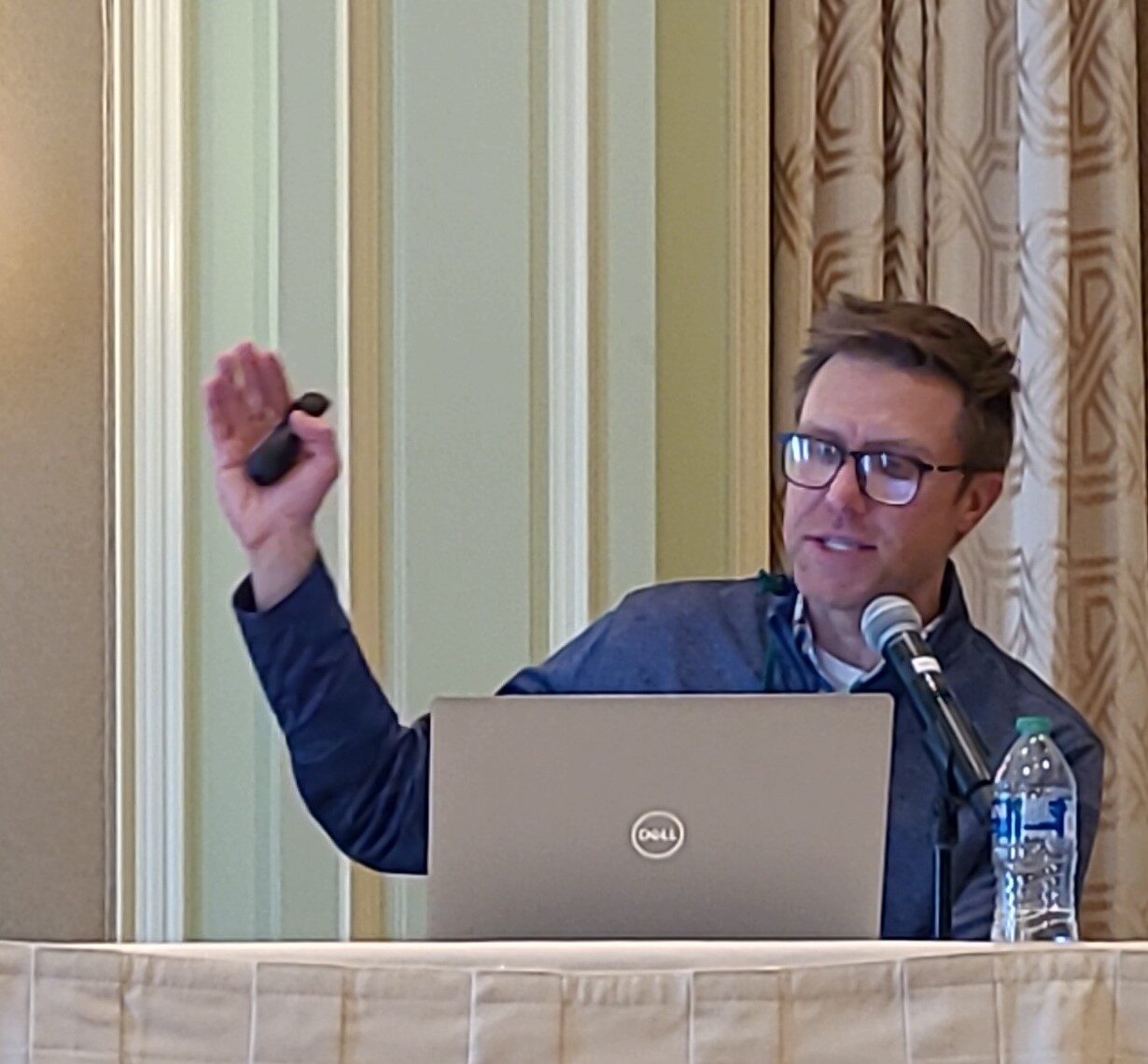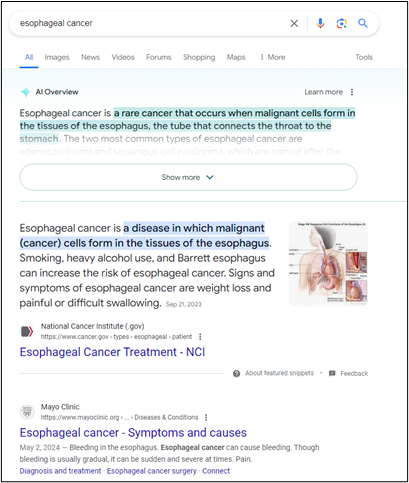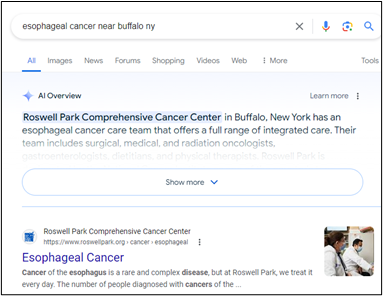
Crystal Weber
July 22, 2024

Why don’t we rank for “this or that”? As content marketers and strategists, we’ve all heard this and many other questions from stakeholders regarding organic search rankings and results.
At NACCDO-PAMN, an annual marketing and public relations conference for cancer center teams, savvy content strategist Dan Cave presented data-driven answers to SEO questions his team fields from curious clinicians and stakeholders.
Dan, the Digital Marketing and Intranet Manager at Roswell Park Comprehensive Cancer Center, uses SEO best practices to improve their website’s performance and build trust among the digital and clinical teams.
Here are three common questions and answers that Dan discussed at NACCDO-PAMN 2024.
Let’s say, for example, you search for “esophageal cancer.” Your search results display several healthcare institutions—but not your own. Avoid the urge to panic. This doesn’t automatically indicate an SEO issue.

An important question to consider is, what is your intent behind this search? “Esophageal cancer” is a broad topic with many avenues to pursue: symptoms, diagnosis, treatment, recovery, management.
Google is good, but it’s not perfect. It returns the most logical results based on the most authoritative sites and best-perceived user experience.
Listen Now: User Intent & Search Generative Experience
Put yourself in the shoes of someone searching for a particular term. Consider what they are specifically looking for and hoping to accomplish with that search. When you search for something, you expect to get personalized, instantly relevant answers.

Help Google give you more relevant results by being direct and specific with your search queries. Something like “esophageal cancer near buffalo ny” (or “esophageal cancer near me”) offers more relevant results for which prospective patients are more likely to search.
Examine stakeholder questions case-by-case to ensure you have content on your site that caters to common questions your users expect to find answers to.
When answering questions like this, avoid going right to “we can’t control Google.” You do control your content. Don your detective hat to identify and fill your content gaps.
Gather and parse your website’s data using GA4 or another solution that fits your needs. For example, before Roswell Park launched their new patient-facing website, they worked with Stamats to integrate the robust research and education that takes place there into the website content.
After reshaping Roswell Park’s content story sitewide, they experienced a 15% increase in pageviews and 6.4% new users year-over-year, and applications to their high school summer program doubled. They were definitely getting found more!
Roswell Park uses Matomo Analytics, which is an alternative for Google Analytics that is privacy-friendly and provides high-quality data.
Find a data solution that works well for you and start digging. Get a clear understanding of:
Review your site search history to see what keywords and phrases users are typing. This may reveal content they are unable to find and that you need to add. In this process, you begin to get a feel for the entire user journey. This helps you uncover ways to update and expand your content in ways that resonate with your audience.
SEO is always changing, so your content requires ongoing optimization to keep up. Watch your website’s metrics and remain cognizant of any notable shifts in your organic traffic, such as month-over-month changes. If something seems off, find out if there was an algorithm shift or a core update you missed. Here are some ways to prioritize your content optimization projects:
Conduct regular content audits and flag anything that could use a refresh. Implement a strong governance policy for updating or removing content that is out of date or irrelevant. Your digital web and marketing teams need to be in constant communication, sharing data, keyword insights, and SEO opportunities.
Be aware of new developments at your institution that need web content. If you discover the content doesn’t yet exist, you’ve uncovered a golden opportunity. Work with a subject matter expert to create your new content.
People often ask what should go on a webpage versus a blog. Healthcare and academia websites must follow a very specific content strategy for pages on the site to remain aligned with the site’s information architecture (organized structure) and goals supporting the user journey.
Blog stories offer more flexibility. Use blogs as an avenue to address niche topics, instill brand credibility, and build trust. Not all users are at the point in their journey to make an appointment. In healthcare, use a blog to explore a novel treatment option, share new research, or tell a patient story. Blogs offer quick answers to the questions your users are asking.
Sometimes missing content isn’t the culprit. Let’s say you have a page on a very specific topic brimming with fact-based insights, but it doesn’t show up in search. How can this be?
If your content isn’t showing up on search, make sure each of the following is true:
If each of those factors is true, check the page’s content and analytics, as well as organic traffic throughout your site. Research any recent Google updates you may have missed.
Check-in with your user interface designer and technical team regularly to ensure your technical SEO is in line. They monitor crucial behind-the-scenes factors such as:
If your content is relatively new and everything is working properly, Google may simply not realize it exists yet. It can take search engines a few days or weeks to crawl your site and start the SERP ranking process for new content. Doing SEO is a mix of immediacy, long game, and detective work.
A strong SEO strategy carried throughout a website can help you enhance your search result presence. As you continue to curate content, draw upon those insights and your existing pool of SEO knowledge for:
Remember, you’re the expert. Get familiar with all things SEO. Know your web content in and out and remain educated about how Google works and what it wants. Doing this gives you the knowledge base needed to tackle issues as they arise.
SEO is always changing, and we all must adapt along with it. Stay on top of Google’s core updates, ranking factors, and algorithm changes. As Chat GPT and Gemini impact traditional search, consider “doubling down” on longtail keywords to remain relevant in AI conversations. In addition, there are plenty of blogs, newsletters, YouTube channels, and podcasts that dig into these topics.
SEO is a marathon, not a sprint. If you’re new to the content strategy game, start small with 5-10 pages and follow SEO and content best practices. Get a few pages of content right, then continue building from there.
Need help with your SEO strategy? We’d love to connect and discuss your content strategy and how SEO fits into it. Email us today.
Related reading: “Do You Do SEO?” We Do, and You Should Too